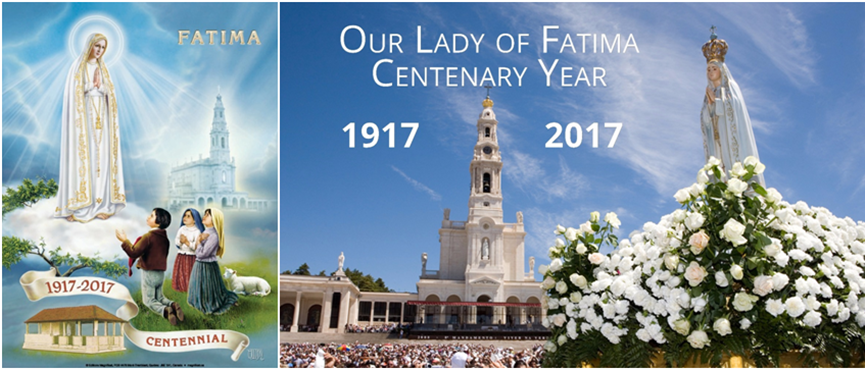



ALWAYS AND EVER OUR MOST BELOVED BENEDICTUS XVI


 Please see preceding page for earlier posts today, June 21, 2017.
Please see preceding page for earlier posts today, June 21, 2017.

 Here is a belated translation of a June 14 blogpost by Aldo Maria Valli on the message of Fatima, prompted by Pope Francis’s recent visit
Here is a belated translation of a June 14 blogpost by Aldo Maria Valli on the message of Fatima, prompted by Pope Francis’s recent visit
there, but he does not cite the reigning pope in these selected recollections. Probably because Bergoglio said that the primary message
of Fatima was 'peace', and of course, he never mentioned Our Lady's refrain of 'Penance, penance, penance!' for what the world needs.
The words attributed here to Pius XII (before he became pope) are particularly striking – first, because I had never read them elsewhere
before, and second, because they seem to have intuited, long before there was any big to-do about a Third Secret, at the greater tragedy
awaiting the Church predicted by Our Lady 100 years ago, and which many intelligent and generally reliable commentators have claimed
referred specifically to apostasy at the summit of the Church. (Another reason I am convinced that apostasy, not heresy, is the right
accusation to make against Jorge Bergoglio.)
Fatima and the words
of three popes – Pius XII,
John Paul II and Benedict XVI
Translated from

June 14, 2017
On the occasion of this pope’s trip to Fatima, there has been a renewed interest in the revelations made by Our Lady to the three shepherd children.
According to the book
Pie XII devant l’histoire (Pius XII in the eyes of history) by the French authors Georges Roche and Philippe Saint Germain, the future Pope Pius XII – then Cardinal Eugenio Pacelli and Secretary of State to Pius XI – spoke about Fatima in 1933, 16 years after the apparitions, to his friend Count Enrico Pietro Galeazzi, and said that it was
a warning against the ‘suicide’ of the Catholic Church which would come about through the destruction of the liturgy and ‘changing the faith’.
Here is how he expressed himself:
Suppose, dear friend, that Communism were simply one of the more evident instruments of subversion used against the Church and the traditions deriving from Divine Revelation!... I am concerned by the message that the Blessed Virgin gave to Lucia in Fatima. Mary’s insistence on the dangers that threaten the Church is a divine warning against the suicide in changing the faith, her liturgy, her theology and her soul…
All around me I sense the work of innovators who want to dismantle the Holy Church, to destroy her universal flame, reject her ornaments and make her feel guilty of her history… A time will come when the civilized world will deny God himself, when the Church will doubt as Peter doubted. A time when it will be thought that man has become God… In our churches, Christians will search in vain for the red light [of the tabernacle] which shows where God awaits us. And like Mary Magdalene in tears before the empty tomb, they will ask, “Where have they brought him?”
Cardinal Pacelli also mentioned the Church in the less developed countries of Africa and Asia, saying that a possible salvation for the Church could come from them, from priests raised in cultures less contaminated by modernism.
We have no incontrovertible proof that Cardinal Pacelli actually said these words, but in any case, they are certainly thought-provoking, and some may even call them prophetic.
In my case, re-reading those words attributed to Cardinal Pacelli prompted me to another re-reading. This time, of what Benedict XVI said to newsmen on May 11, 2010, in his news conference enroute to Portugal for an apostolic visit to mark the tenth anniversary of the beatification of Jacinta and Francisco Marto (who were canonized last
May).
He answered a question formulated for the press corps by Vatican Press Office director Fr. Lombardi:
Holy Father, what meaning do the apparitions of Fatima have for us today? When you presented the Third Secret of Fatima in a press conference at the Vatican Press Office in June 2000, many of us and other colleagues asked if the message of the secret could be extended, beyond the assassination attempt against John Paul II to other sufferings of the popes. Could the context of that vision also be extended to the suffering of the church today, for the sins of the sexual abuse of minors?
First of all, I want to express my joy in going to Fatima, to pray before Our Lady of Fatima, and to experience the presence of the faith there, where from little children, a new force of the faith was born, and which is not limited to the little ones, but has a message for the whole world and all epochs of history, and touches history in its present and illuminates this history.
In 2000, during the presentation, I said that there is a supernatural impulse which does not come from the individual imagination but from the reality of the Virgin Mary, from the supernatural, that impulse which enters into a subject, and is expressed according to the possibilities of the subject. The subject is determined by his or her historic, personal, temperamental, situation.
Therefore, supernatural impulse is translated according to the subject’s possibilities to see, imagine or express it.
But in these expressions, formed by the subject, a content is hidden, that goes beyond, goes deeper. Only in the passage of time is the true depth, that was clothed in this vision, revealed to us, only then is it possible for concrete people.
Here too, beyond this great vision of the suffering Pope, which we can initially circumscribe to John Paul II, other realities are indicated which over time will develop and become clear.
Thus it is true that beyond the moment indicated in the vision, one speaks about and sees the necessity of suffering by the Church, which is focused on the person of the Pope, but the Pope stands for the Church, and therefore it is the sufferings of the Church that are announced.
The Lord told us that the Church will always be suffering in various ways, up to the end of the world. The important point is that the message, the answer of Fatima, it not substantially addressed to particular devotions, but is the fundamental response: permanent conversion, penance, prayer, and the three cardinal virtues: faith, hope and charity.
Here we see the true, fundamental response the Church must give, which each of us individually must give, in this situation.
In terms of what we today can discover in this message, attacks against the Pope or the Church do not only come from outside; rather the sufferings of the Church come from within, from the sins that exist in the Church.
This too has always been known, but today we see it in a really terrifying way: the greatest persecution of the Church does not come from enemies on the outside, but is born from the sin within the church. The Church therefore has a deep need to re-learn penance, to accept purification, to learn on one hand forgiveness but also the need for justice.
Forgiveness is not a substitute for justice. In one word we have to re-learn these essentials: conversion, prayer, penance, and the theological virtues. That is how we respond, and we need to be realistic in expecting that evil will always attack, from within and from outside, but the forces of good are also always present.
Finally, the Lord is stronger than evil and the Virgin Mary is for us the visible maternal guarantee that the will of God is always the last word in history.
At that time, in early 2010, attacks against the Church were at a peak, specifically attacks against Papa Ratzinger personally, because of priests who had committed sexual abuse on minors, a fact that Fr. Lombardi cited in the question.
Therefore all of us newsmen on that plane, when Benedict XVI cited persecution that does not only come from outside the Church but from within the Church, automatically thought he referred to the so-called ‘pedophile’ scandal and the proceedings then underway against bishops and priests in many parts of the world, whether for direct commission of the acts, or for failure to denounce such acts as soon as they were made known.
But one must point out that the Pope, speaking about the sin that exists in the Church, made no direct reference to the sex abuse scandals. Certainly, he had it in mind, and certainly his words also referred to that scandal, but he meant more than that. Because faithlessness can be manifested in many forms.
I therefore find that
there is a visible link between the considerations mentioned by Cardinal Pacelli in 1933 and those of Benedict XVI in 2010, because in both cases, they were referring to the Church and how it keeps the faith.
Along this thought, I was also spontaneously reminded of the German magazine
Stimme des Glaubens (Voice of Faith) which had an article in 1981 about a meeting between John Paul II and a group of German Catholics in Fulda, during the pope’s apostolic visit to Germany in November 1980.
To a question about Fatima and the Third Secret, the Pope said it could also refer to natural catastrophes, but he underscored that in any case, the medicine against all evils was the Rosary. And on the future of the Church, he said:
“We must prepare ourselves to face within not so long for many great trials which may even require the sacrifice of our lives and giving ourselves totally to Christ and for Christ… With your prayers and mine, it will be possible to mitigate these tribulations but it is no longer possible to avoid them because it is only in this way that a total renewal of the Church is possible. How many times in the past has the renewal of the church sprung from bloodshed! It won’t be different this time. We must be strong and prepared, trust in Christ and his Mother, and recite the rosary very very assiduously.”
In 1980, Karol Wojtyła had not yet been the target of assassination by Ali Agca, which took place on May 11, 1981, but already, he spoke about great trials, risk of life and the need to be prepared.
But also in Fulda at that time, in his homily for a Mass he celebrated for priests and seminarians, John Paul II underscored that, among other duries, a shepherd must watch and be vigilant:
“Service is this – to stay awake for the return of the Lord”. And because “the treasure entrusted to us is infinitely precious”, he said the primary duty of a pastor was to “make ever more profound the roots of our faith, our hope and our love for the great works of God” (Acts 2,11).
To stay awake for the return of the Lord, to watch, to be vigilant, to pray in the service of an infinitely precious treasure, deepening the roots of faith ever more in the works not of man but of God. Ultimately, this is what Fatima tells us. It is a message that is always actual. More actual than ever.
[Modificato da TERESA BENEDETTA 22/06/2017 01:14]